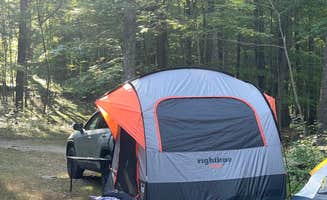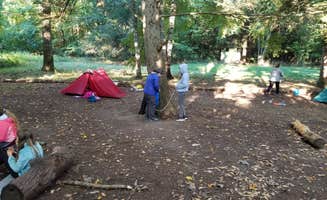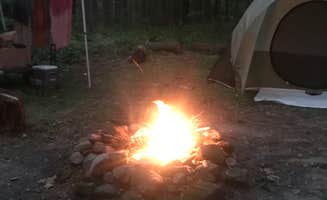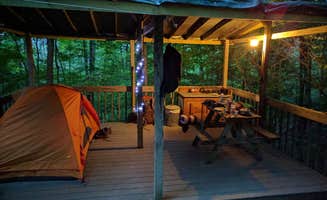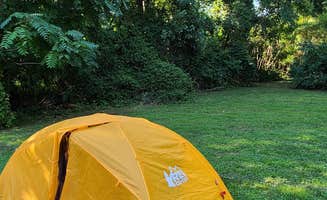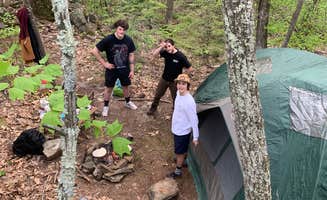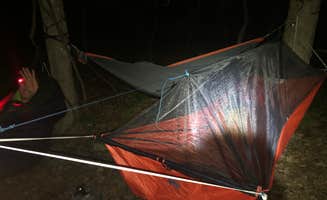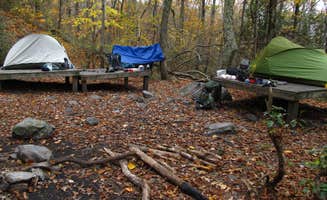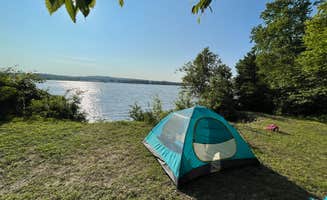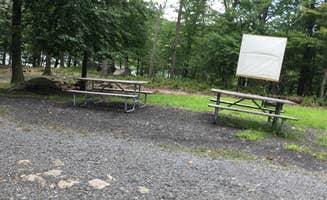Tent camping near Sandy Hook, Connecticut offers options beyond established campgrounds, with primitive sites available for those seeking more solitude. The area's topography features rolling hills and small mountains, with elevations ranging from 400 to 1,000 feet throughout the region. Winter camping is available at several locations, though water access may be limited during freezing months.
What to do
Hiking extensive trail networks: At Ward Pound Ridge Reservation, over 40 miles of trails wind through diverse terrain. "This is a great place for camping. The shelters are great for people who want to camp and not have to worry about unplanned weather. The best part of this campsite are the endless trails in the area," notes Ethan K.
Lake activities: Mountain Lakes Park offers several recreational lakes within the property. A camper named Ben H. described it as "A gorgeous piece of land that contains lakes, a lookout and Mt. Bailey, the highest point in Westchester County. A dirt road loops through the property with trails off and through it."
Stargazing opportunities: Open fields at several campsites provide excellent night sky viewing. Seth K. from Ward Pound Ridge mentions, "This is a great local spot that I love to go to get out of the city for a little bit. There's elevation gain, creeks, and open fields for stargazing."
Winter activities: Several parks remain open year-round with seasonal recreation options. "Ward Pound Ridge is very well known to the locals as a great place for sled-riding in winter (Pell Hill area) and a place for big group gatherings," shares Ming R.
What campers like
Proximity to NYC: Many camping options within 90 minutes of the city make weekend escapes practical. As noted about AMC Harriman Outdoor Center, "This campsite is accessible by public transportation. There is a shuttle run by the campsite to and from Tuxedo Park Train Station."
Shelter options: Several parks offer lean-to structures for those who prefer not to pitch tents. Paul R. mentions, "They have great sights and are open all year round. I've stayed in hammocks, tents, lean-tos, and even did a good share of car camping. All of the shelters have fire pits and some have interior fireplaces."
Lake swimming: Multiple camping areas provide lake access during summer months. At Sebago Cabin Camp, Katherine T. recommends, "Near lake Welch- which is phenomenal for easy nearly-beach like camping... Don't expect to swim on site- go to Lake Welch near by!"
Primitive camping experience: For those seeking a more rustic experience, Onion Mountain Park offers basic sites. "We ended up finding a very primitive spot off the blue trail (on top of the mountain), where we settled down for the night. The spot is not very big so make sure to bring a smaller tent (no group sites) but has a firepit already set up," shares Nora S.
What you should know
Reservation systems vary: Some parks require in-person booking while others don't take reservations. Anil S. at Croton Point Park suggests, "I would recommend call earlier and come in few minutes earlier to 9 am when the office opens to find the best spots."
Wildlife awareness: Bears and coyotes are common throughout the region. At Onion Mountain Park, campers recommend, "We did put a bear bag about 100 feet away." Rangers recommend storing food in vehicles or bear-resistant containers when available.
Site sizes and configurations: Many tent sites accommodate limited group sizes. Ming R. notes about Ward Pound Ridge, "A maximum of eight people in two tents are allowed at each site. But if you really do have a party of eight, one picnic table seems to be inadequate."
Bathroom access varies: Facility access differs significantly between campgrounds. Jonathan C. at Croton Point mentions, "Tent site is after the RV site, so use their LX before you get to site if you can."
Seasonal restrictions: Some parks have limited winter access or seasonal facility closures. Check ahead, as many parks reduce services during off-peak seasons.
Tips for camping with families
Look for playground proximity: Hidden Lake Farm and similar sites offer family-friendly amenities. Croton Point Park has "a playground within sight of our camper," according to Thomas.
Consider noise levels: Family campgrounds can vary in evening quiet enforcement. At Croton Point Park, one camper noted, "The site was very loud (dance music) until after 11pm. Quiet time at 10pm. Great site for a party, try to stay away from this end of the site."
Choose sites near facilities: When camping with children, proximity to restrooms matters. Ming R. points out, "The sites are much farther away from the comfort stations than most campgrounds we have been to. But there are port-a-potties very close to the sites, which is very important when you have young kids."
Scout park programs: Many parks offer family activities, especially in summer. Sebago Cabin Camp "has a ton of activities like outdoor movies and communal bonfires on weekends. I was told by ranger Joe they also do Karaoke nights too," reports Sara P.
Trail difficulty considerations: Review trail maps for family-appropriate hiking options. Susana M. mentions Ward Pound Ridge has "nice trails and creeks to feel away from it all."
Tips from RVers
Limited hookup options: Few campgrounds near Sandy Hook offer full RV services. Those that do, like Croton Point Park, typically have "a mix of w/e (6 sites) and FHU sites" as Lee D. notes.
Site layouts vary: Many RV areas feature back-to-back arrangements with limited privacy. According to Lee D. at Croton Point Park, "The FHU sites were back-to-back and although there were trees separating the sites, they were close together."
Gate access restrictions: Some parks have limited entry hours or require gate keys. Be aware of arrival time restrictions and procedures, as some parks may not accommodate late check-ins.
Cell service limitations: Connectivity varies widely between campgrounds. As Sara P. discovered, there's "Absolutely zero phone service (for T-Mobile) which was AMAZING."
Know your site assignment timing: At some parks, "You need to call (no online reservations) and then wait for an e-mail, but the e-mail does not tell you your assigned site; you have to wait until you check in to find out your site," according to Lee D.


